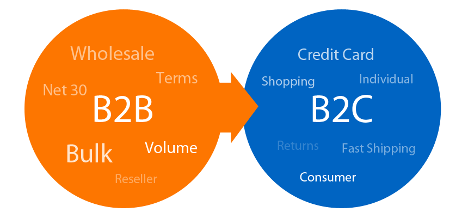In the business world, we often hear about B2B and B2C, ever wonder which one to choose?
In my view, both B2B (Business to Business) sales and B2C (Business to Consumer) sales play indispensable roles in the supply chain. Despite targeting different customer bases, their individual impacts are equally crucial for a company’s prosperity. Drawing from my experience as a former business owner, about 65% of my products found their way to consumers, while 35% were sold to other businesses. I firmly believe that having a mix of B2B and B2C clientele can bolster market expansion and reduce economic vulnerabilities.
Understanding the Differences:

Sales Objectives:
- B2B Sales: Focus on meeting the needs of other businesses or organizations, emphasizing long-term partnerships, and providing professional services.
- B2C Sales: Directly target individual consumers, emphasizing product appearance, appeal, and pricing.
Product Positioning and Pricing Strategy:
- B2B Sales: Product positioning emphasizes functionality, performance, and solutions, with pricing often based on value and cost-effectiveness.
- B2C Sales: Product positioning leans towards creating emotional resonance and personalized experiences, with pricing influenced by competition and market trends.
Sales Cycle and Decision Processes:
- B2B Sales: Typically entail longer sales cycles, dealing with complex decision processes and multi-layered decision-makers.
- B2C Sales: Have relatively shorter sales cycles, with purchasing decisions often based on emotions and immediate needs.
Marketing Strategies:
- B2B Sales: Often employ more specialized and personalized strategies, such as attending industry trade shows, client visits, and offering customized solutions.
- B2C Sales: Tend to focus on mass markets and advertising, including social media ads, TV commercials, and promotional activities.
Risk Management and Customer Support:
- B2B Sales: Require more complex risk management, necessitating professional after-sales support and solutions tailored to meet specific customer needs.
- B2C Sales: Involve relatively lower risk management but require heightened attention to customer satisfaction and the ability to respond quickly to issues.
Why Both B2B and B2C Sales Matter?
Transaction Scale and Value:
- B2B Sales typically involve larger-scale transactions and higher transaction values, serving as the primary source of profitability for businesses.
- According to the 2022 B2B E-Commerce Forecast, US, B2B e-commerce in the United States is expected to reach $30 trillion by 2027.
Cash Flow and Market Share Stability:
- B2C Sales provide stable cash flow and market share, helping businesses maintain competitiveness in fierce market competition.
- As pointed out by Steve Pruden, CEO of CX consulting firm Studio Science, B2B business innovation often stems from B2C experiences, making B2C a critical stage for B2B companies.
- According to the March 2024 SaaS Market Report, since 2022, B2B sales have grown by 5.5%, while B2C sales have grown by 6.1%, marking a new high in the last two years.
In conclusion, while B2B and B2C sales differ in target customers and marketing strategies, their importance in the commodity supply chain is equal. Leveraging the strengths of both and adopting different sales channels can help businesses achieve robust and sustained growth, leading to greater success.







